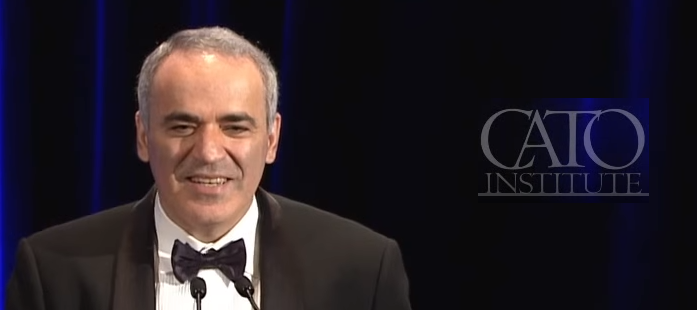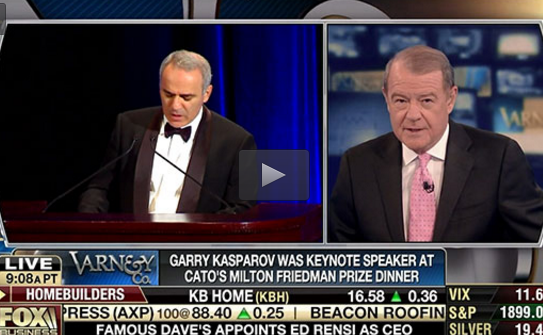

Garry Kasparov Keynote Address – Milton Friedman Prize Dinner 2014
Cato Institute Event – New York City – The Waldorf Astoria – May 21, 2014
https://www.youtube.com/watch?v=iYEg4DWgR7Y
Thank you for inviting me here today to speak about a few topics dear to my Soviet-born heart: individual freedom, limited government, and traditional American values! If only my die-hard Communist grandfather could see me now!
And congratulations the winner of the 2014 Milton Friedman Prize for Advancing Liberty, Leszek Balcerowicz. Very much thanks to him, Poland has become the success story that gives Vladimir Putin nightmares – and for that I personally thank him! If it can happen in Poland it can happen in Ukraine, and that would be an unacceptable role model for Putin.
If only the West’s current leadership supported Ukraine as passionately as Ronald Reagan and Margaret Thatcher supported the Polish Solidarity movement. Sometimes I joke that if guys like Obama and Cameron had been in power in the 1980s I would still be playing chess for the Soviet Union!
In his 1962 book, “Capitalism and Freedom,” Milton Friedman wrote, “History suggests that capitalism is a necessary condition for political freedom. Clearly it is not a sufficient condition.” That is, we must still fight for human rights and that fight must be fought on principles.
Like probably half the people in this room, I’m currently working on a book project I never have time to finish. Its central theme is the shift in American values over the past four decades. Ronald Reagan’s shining beacon on a hill of my Soviet youth has moved away from the freedom agenda, both domestically and internationally. The traditional American values of liberty, sacrifice, risk-taking, and even faith, have declined. On the rise are safety over risk, equality over excellence, comfort over sacrifice, and hyper-partisanship that fights harder and harder for smaller pieces of a smaller pie.
The working title of my manuscript is a little shocking to some: “Un-American”. But it is perfectly accurate. I am myself literally un-American. Although, I like to say I was born in the Deep South, right next to Georgia… The Deep South of the USSR, in Baku, the capital city of Azerbaijan, right next to the Republic of Georgia.
But the title Un-American also comes directly from the dictionary: “adjective; not characteristic of or consistent with American customs, principles, or traditions.” And in my opinion there is much about the America of 2014 that fits that description far too well. This is a tragedy not only for Americans, but for the entire world that has depended on, and learned from, the United States – its economy, its military, its technology, its moral leadership – for over a century.
It is no coincidence that this rise of un-American values has been accompanied by a rise in global criticism of the United States and the system that made it so successful.
By “system” I do not mean democracy, although the rise of China and the arrogance of dictators like Putin and Assad in the face of weak Western opposition has allowed the superiority of democracy to be questioned. An even more dangerous delusion is the increasing attack on the free market concept itself, attacks on the principles of capitalism that have created our unprecedented standard of living.
On one hand, the critics are correct. It is important to talk of the ills of society. Many have forgotten that the American Dream was not simply to get rich. Immigrants didn’t come because they thought the streets here were paved with gold. The American Dream was for your children to have a better life. The immigrants came because in America they would be rewarded for their hard work. … And if they got rich in the process, well, that was okay too!
In recent years the attacks on capitalism have increased as inequality has increased. It is a logical correlation, but also a false rationale. Thomas Piketty’s book, “Capital in the 21st Century,” has become that rare economics bestseller, although I’m not sure many of the buyers are actually reading it. But capitalism has not failed us; we have failed capitalism.
I’m afraid my memory is not photographic as some of the legends about me say, but I am sure I would remember if the works of Adam Smith included the phrase, “too big to fail!” When the state steps in, deciding which companies live or die, things have gone terribly wrong. If a bankrupt small business in South Carolina can go belly up, so must General Motors, so must Goldman Sachs. Sorry guys, no offense meant! Much of the conservative conversation about the government is about making it smaller. But size isn’t everything. A small government can still be dangerously interventionist. Limiting the government’s power should come before worrying about its size.
When you base your policies on principles there is no room for “but.” “We believe in the free market but…” That’s trouble! “We will defend democracy and freedom and human rights, but not in Ukraine…” Trouble again. Rising inequality is a critical problem today, and it comes from decades of moving away from the principles of excellence that had created the richest society in history by the end of the 1960s.Trying to repair the damage of nearly two generations of value shift with policies that attempt to enforce equality will only make things worse. Trust me, I am from a place where everyone was supposed to be equal, or else, and it wasn’t as nice as some of today’s liberal commentators seem to think it would be!
As someone who looked at America through the Iron Curtain I have strong feelings about the relationship between the importance of freedom at home and caring about freedom globally.
Americans are tired after two long and painful engagements in Afghanistan and Iraq. Most do not want to hear about America’s responsibilities, or the importance of standing up for human rights around the world. But when you betray the notion that freedom is worth defending everywhere, you begin a very dangerous path for America and the world. If it matters at home, it matters everywhere. The US, Europe, and other democracies thrive with global stability. Dictators like Putin, especially ones with energy resources, thrive with global instability. Western leaders saying they must focus on domestic issues and jobs are short-sighted and only postpone the inevitable conflict. Economic growth requires stability and that cannot exist when Putin can annex a chunk of a European nation with impunity and launch a paramilitary invasion of Eastern Ukraine.
And don’t tell me Putin is too dangerous, or Russia too powerful to challenge. More dangerous than Josef Stalin when Harry Truman saved West Berlin in 1948? Ordering the airlift of supplies to the besieged city for 11 months – against the advice of his top generals? What is lacking today is that leadership, leaders willing to stand up to dictators who only respect strength. Ronald Reagan had two things more recent free world leaders lack: principles and the credibility only principles can provide.
The Cold War was not won just because of American technology or the disastrous Communist economy. It was also values, what the whole world calls – or used to call – American values. For those of us behind the Iron Curtain, we knew people outside genuinely cared, that we were not alone, that Americans believed individual liberty was for all, not just those lucky enough to be born into it. Is that true today? Reagan said that “Freedom is never more than one generation away from extinction.” We cannot take it for granted.
Let us turn to a more academic note for a moment. Think of three fundamental documents that established in writing our definitions of modern civil society. The English Bill of Rights, 1689. The American Declaration of Independence, 1776. The French Declaration of the Rights of Man, 1789. So, how many times is the word “democracy” mentioned in them? The answer is zero. The method by which leaders were chosen was not yet a relevant issue. The fundamental rights that defined the relationship between the government and the people, that is what mattered. The right to opportunity. The right for the government only to protect, not to promote. And that is still true today.
Individual freedom is the basis for the free market system of all successful economies. It is the basis of a foreign policy that says freedom for others is as important as for one’s self.
Risk, excellence, sacrifice, faith, unity. American values that were good for world and good for the American economy. Not coincidentally, these are also the values of innovation and entrepreneurialism, of new technologies, new industries, and new jobs.
Since roughly 1970, there has been a shift away from those values and toward their opposites. A shift toward security, equivalence, comfort, cynicism, hyper-partisanship.
In the span of one generation the world’s greatest entrepreneurs and capitalists convinced themselves that there could be reward without risk! It is time to wake up from this dangerous delusion, built on a mountain of debt. It is time to dream again of exploration and excellence and everything else that made, and makes, America great.
In 1980, Milton Friedman said, “Society doesn’t have values. People have values.” Yes, and we must talk to people about these principles of freedom – work with people – not against them, not even for them – to rediscover the values of big challenges, of seeking new opportunities, of doing things because they are hard. It is, or should be considered, un-American and anti-capitalist and anti-democratic to expect a government or employer or any other institution to take care of you beyond physical security and maintaining a level playing field.
For the government to get out of the way, the people have to demand it. Aiming high, believing in yourself and the power of your desires to change the world is an essential part of citizenship in a democracy, especially the greatest one of all. The best way for America to thrive and to lead is for it to once again serve as a model of how successful a nation can be when the government stays out of the dreams of its people.
Thinking short-term, thinking about the next poll or the next election or the next term, has very strict limits. It can work tactically sometimes, but will fail strategically. Barry Goldwater lost terribly in 1964, but the ideas of his campaign laid the foundation for the Reagan Revolution. At some point you have to run on principles not just policies and soundbites. You have to run on the future of the country, and the future of the world. Thank you.


